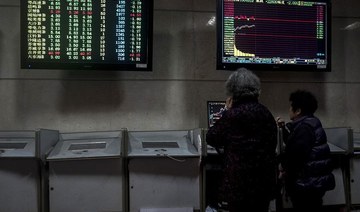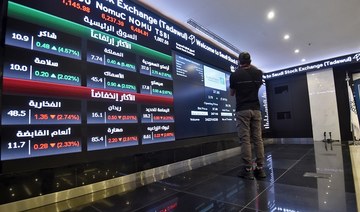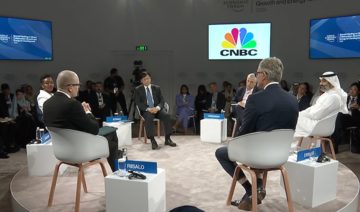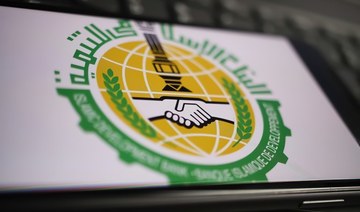BEIJING: Asian stocks followed Wall Street higher Tuesday after President Joe Biden invited Republicans to a meeting to discuss economic aid, while silver eased off an eight-year high.
Market benchmarks in Shanghai, Tokyo, Hong Kong and Seoul all advanced.
On Wall Street, the benchmark S&P 500 index gained 1.6 percent, recovering some of losses earlier in the week amid frenzied trading of video game retailer GameStop and other stocks targeted by novice day traders.
In Washington, Biden invited 10 moderate Republicans to the White House to discuss his proposed $1.9 trillion economic aid plan. Republicans earlier countered with an offer of $600 billion, or less than one-third of Biden’s proposed amount.
“The sound of more stimulus, which tends to raise all boats, was music to the market’s ears,” said Stephen Innes of Axi in a report.
The Shanghai Composite Index rose 0.5 percent to 3,523.71 while the Nikkei 225 in Tokyo added 1 percent to 28,376.20. The Hang Seng in Hong Kong advanced 1.9 percent to 29,453.37.
The Kospi in Seoul was 2.1 percent higher at 3,120.27 and Sydney’s S&P-ASX 200 gained 1.2 percent to 6,744.70.
New Zealand and Jakarta retreated while Singapore and Bangkok rose.
Silver declined after jumping at one point to its highest level in eight years.
Silver for March delivery shed 81 cents, or 2.7 percent, to $28.61 per ounce in London.
Last week, there were messages on the Reddit forum WallStreet Bets and other places on social media encouraging small investors to buy silver. It shot up Monday, but many online investors said it wasn’t them bidding up the price.
Smaller traders are learning “the silver market is much bigger than some of the small cap stocks they have been trading,” said Edward Moya of Oanda in a report. “Silver coin purchases and call option bets are not enough of a driver to send silver prices skyrocketing to record high levels.”
On Wall Street, the S&P 500 index gained to 3,773.86. The Dow Jones Industrial Average rose 0.8 percent to 30,211.91. The Nasdaq composite climbed 2.5 percent to 13,403.39.
US markets have been roiled by frenzied trading in GameStop and some other stocks that had been expected to decline but surged after novice traders bought. Other investors said hedge funds that bet against those stocks were losing money and selling other shares.
GameStop slumped 30.8 percent to $225 a share. It ended last year at about $18.
Tech stocks led the way higher. Communication stocks and a variety of companies that rely on direct consumer spending such as Starbucks and AutoZone also helped lift the market.
Hopes for economic aid, along with the Federal Reserve’s pledge to keep low-cost credit plentiful, have carried the S&P 500 and other major indexes to record highs.
Investors bid up stocks heading into 2021 in expectation the rollout of coronavirus vaccines would allow global business and travel to return to normal. That optimism has been dented by infection spikes and disruptions in vaccine deliveries.
Markets were rattled last week by AstraZeneca’s announcement it would supply the European Union with fewer than half the promised doses, which prompted the EU to impose export controls. On Sunday, AstraZeneca promised to increase European supplies and start delivery earlier.
In energy markets, benchmark US crude rose 52 cents to $54.07 per barrel. The contract gained $1.35 on Monday to $53.55 a barrel. Brent crude, used to price international oils, added 49 cents to $56.84 per barrel in London. It advanced $1.31 the previous session to $56.35.
The dollar edged down to 104.92 yen from Monday’s 104.94 yen. The euro rose to $1.2086 from $1.2066.
Asian stocks follow Wall Street up, silver eases off high
https://arab.news/guxje
Asian stocks follow Wall Street up, silver eases off high
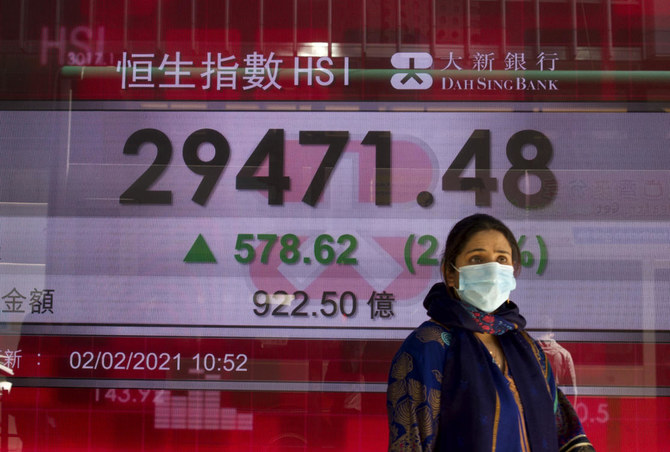
- Market benchmarks in Shanghai, Tokyo, Hong Kong and Seoul all advanced
Homeland economies face growing challenges amid global turmoil, WEF special meeting in Riyadh told
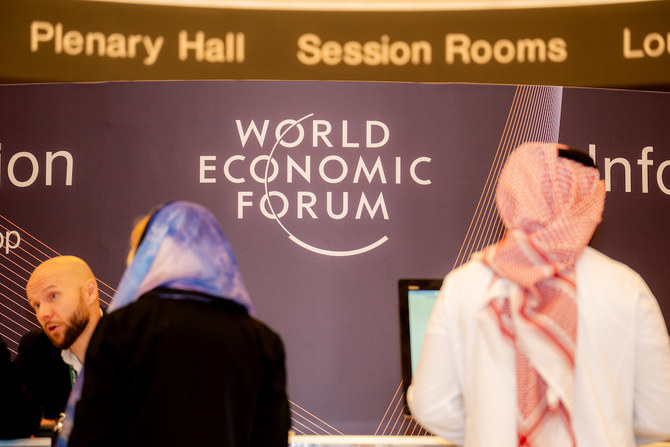
- Partnerships and alliances essential to restore equilibrium, protect security, experts and ministers tell panel discussion
RIYADH: Tensions in the Red are weighing heavily on Egypt, adding to the burdens caused by recent global crises such as the war in Ukraine and the pandemic, the country’s minister of planning and economic development told the World Economic Forum special meeting.
Speaking during a panel discussion on “What Homeland Economics Means for Trade,” Hala Elsaid Younes said that Egypt, like the rest of the world, has faced unprecedented crises in recent years, stemming from climate change problems, the global pandemic, the Russian-Ukraine war, and now the conflict in Gaza.
In order to combat these problems, Egypt has been focusing on controlling inflation, and investing in its labor force and infrastructure, she said.
“What is taking place in the Red Sea at the moment, where 50 percent of shipments are now rerouting, has caused a massive recedes in our profits. Regional and international tensions have also led to a rise in interest rates and soaring food prices.
“If this continues, governments will have little capacity to take care of their poor. We are working very hard on investing in our infrastructure by building more ports, and high railways to link the Mediterranean and Red Sea with inland destinations to expand our exports. We are lucky that over 70 percent of our population are less than 40 years old, so we are also investing in vocational training.”
Aloke Lohia, CEO of petrochemical firm Indorama Ventures, said that the company had to make “significant pivots” in recent years.
“We had a brilliant 20-year run where geopolitics were stable, interest rates were low, and the petrochemical business was growing. However, this all changed after COVID and current wars. Consumer demands and production are not matching anymore, and we are reducing 10 percent of our capacity.
“Homeland economies are great for countries which can leverage it, but not all countries are capable. Some countries, like my own Thailand, have to rely on tourism. So we are now looking at manufacturing our products in countries like India, where a large population resides alongside a stable government,” Lohia said.
US Congressman Brad Schneider said many countries are “looking for leadership.”
He added: “Complexities and uncertainties produce challenges for business; we need to engage in partnerships and alliances. I believe the world is safer when the US is engaged with the rest of the world. Creating equilibrium will be easier established when there are partnerships.”
Ahn Duk-geun, South Korean minister of trade, industry and energy, said that the world is “entering a dangerous phase of industrial competition, and we have to find a way to contain this race that so it won’t cause too much trouble for global trade.”
Clifford Kupchan, CEO of the consulting firm Eurasia Group, highlighted the risks posed by artificial intelligence.
“If AI gets into the wrong hands, the results will be worrisome. It will be very easy to create deepfakes and to create destructive weaponry. This will create an imbalance in world powers,” he said.
“When we talk about homeland economics, national security intervening with trade, I don’t think the prognosis is very good. This applies whether it is (Joe) Biden or (Donald) Trump who will head the presidency. We can be heading toward strategical degradation between the US and China.”
Saudi Arabia committed to green technologies, energy minister says
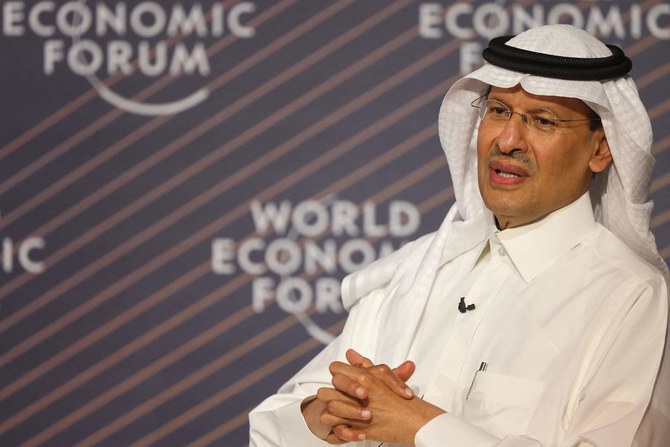
DUBAI: Saudi Arabia is focused on the production of green molecules, said Prince Abdelaziz bin Salman Al Saud, the Kingdom’s minister of energy.
“Our plans are clear to everyone, we are focusing on the molecule,” the prince said at a World Economic Forum meeting in Riyadh. “Being environmentally conscious is our human duty, whatever we do today should not endanger any aspirations of future generations.”
In a session focused on green molecules such as biofuels, hydrogen, and their derivatives, experts discussed various countries’ plans on how to move forward with the production of green molecules.
For his part, Prince Abdelaziz said he believed the concept should be color agnostic, because the molecule business has to do with how we produce clean energy, and that has no color.
“There is a carbon footprint that we need to manage and mitigate. I think stigmatizing things might narrow our choices rather than expand (them). We believe, as Saudis, that we require all the sources of energy, be it nuclear, hydrocarbon-based, or synthetic fuels. We are open to choices.”
The prince also said the kingdom is “libertarian” in its business approach, willing to share the expertise with other countries and that it is already in business with some European states.
“While the technology remains challenging, we continue to work on it to make it accessible and affordable to all,” he said.
The United Arab Emirate’s Minister of Energy and Infrastructure Suhail Al Mazrouei said that, as in Saudi Arabia, leaders in the UAE are aware of the need to invest in new energy.
“The region has become important in tackling problems and coming up with solutions,” Al Mazrouei said. “Clean energy is something we decided to venture into 17 years ago as we were thinking about what is going to happen when we export the last barrel of oil.”
Echoing the prince’s remarks, Al Mazrouei said consumers should not be limited to those considered ready simply because they can afford the price.
“We are working on the technology to make it accessible to all,” he said.
Amani Abou Zeid, commissioner for infrastructure and energy of the African Union, said that Africa has different levels of development and needs and expressed the need for alternative power options.
“Overall we are still electrified in only 49 percent of the continent, so more than half of the population doesn’t have electricity. Africa can’t afford to discard any solution at this point.”
Patrick Pouyanne, chairman and CEO of TotalEnergies SE, alongside Shrikant Vaidya, chairman of India’s Oil Corporation, and Erasmo Carlos Battistella, CEO of Be8, reiterated the importance of accessibility and affordability when producing green molecules.
Despite the positives from those countries engaged in the production of green molecules, such as job creation, there is still a long way to go.
Prince Abdelaziz said: “I think we should be conscious of the fact that the challenge is big, we are still talking about artificial intelligence, the component of the electrification, and what is required for it; the world will require clean molecules (and) it is our hope that we all work together to ensure this happens.”
IsDB annual meeting sees signing of several deals
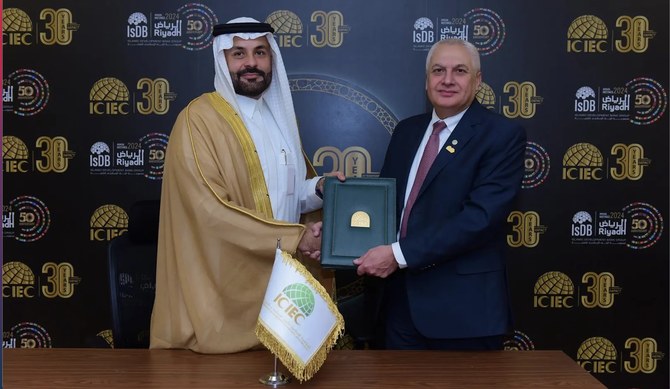
RIYADH: The 2024 annual meeting of the Islamic Development Bank Group saw the signing of several agreements, boosting the telecommunications sector in its member countries.
The Islamic Corporation for the Insurance of Investment and Export Credit, known as ICIEC, which specializes in providing Shariah-compliant insurance services and is a member of the IsDB, announced the inking of a memorandum of understanding with Huawei Technologies Ltd., the Saudi Press Agency reported.
The memorandum was signed by ICIEC CEO Osama Al-Qaisi and the chief operations officer of Huawei Technologies, Silas Zhang.
Under the agreement, ICIEC continues its collaboration with Huawei to enhance the telecommunications infrastructure and leverage advanced communication technology in IsDB member countries.
According to SPA, ICIEC will provide insurance solutions to support the provision of advanced communication network equipment and offer training to key telecommunications operators in member countries.
Al-Qaisi emphasized that the MoU with Huawei represents a significant roadmap toward supporting the enhancement of vital communication framework in member countries through the integration of advanced technology, extensive expertise, and distinguished insurance solutions offered by ICIEC.
He stated: “We are laying the foundation for strong growth and a qualitative leap in the telecommunications sector in member countries, where this collaboration rises to the level of partnership, enabling member countries to harness their full potential to establish a better and more innovative communications sector.”
The ICIEC also signed a MoU with the Federation of Contractors in Islamic Countries, known as FOCIC.
It was signed by Al-Qaisi, and FOCIC President Zakaria Abdul Rahman Al-Abdul Qadir on the sidelines of the IsDB event.
Al-Qaisi explained that the memorandum stems from the institution’s commitment to enhancing understanding and implementation of Islamic insurance in all member countries, aiming to establish a comprehensive framework for cooperation in the areas of knowledge exchange and technical capabilities in the insurance and contracting sectors.
Digital advancements propelling Saudi Arabia toward Vision 2030 goals: top official
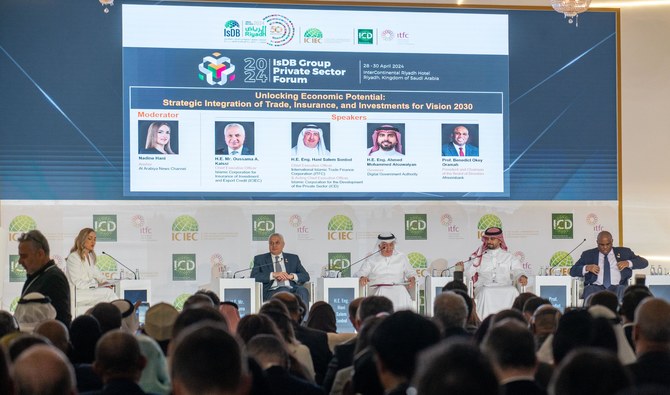
RIYADH: Digital advancements in Saudi Arabia have significantly enhanced efficiency across key sectors, reducing the need for physical visits to government departments and leading to considerable savings, said a top official.
Addressing the annual meetings of the Islamic Development Bank Group, Ahmed Al-Suwaiyan, governor of the Digital Government Authority, highlighted major improvements made through digitalization as part of Saudi Arabia’s Vision 2030 initiatives aimed at enhancing basic services.
He underscored the tangible benefits of increased productivity and decreased expenses for governments, citizens, and businesses.
“In Saudi Arabia, as part of the various programs and objectives of Vision 2030 for basic services, whether it is the issuance or renewal of national IDs, driving licenses, or even passports, before digitalization, it took more than four hours, including the waiting time at government departments,” said Al-Suwaiyan.
Today, he added, it actually takes less than two minutes without the need to visit the government department, requiring only three clicks.
“This has actually made us save more than 160 million trips and more than SR23 million annually,” said Al-Suwaiyan.
He emphasized that “this is the value that we are talking about,” highlighting how increasing productivity and reducing costs benefit not only governments but also citizens and enterprises through digitization.
The governor emphasized how digital transformation has influenced each pillar of the Vision 2030 goals, enabling swift advancements within the Kingdom.
“I would like to speak about Vision 2030, where digital transformation is a key enabler that we can see cross-cutting all the different sectors and all objectives in the development of Vision 2030. If we talk about a “vibrant society,” we can see a clear link with the participation and engagement for every citizen. And the same goes for a thriving economy,” he said.
The official further expressed that merely adopting digitization to do so is not the goal. Instead, the authorities’ efforts are simply a “means” to create a more efficient society.
In the Kingdom’s justice sector, a similar transformation has occurred with the establishment of fully operational virtual courts, where 95 percent of all hearings are conducted online.
However, the primary focus is not solely on the implementation of virtual courts, but rather on achieving specific outcomes.
One notable outcome has been the significant reduction in the time taken for case processing, with the average duration decreasing from 217 days to just 30 days, from the opening of the case to the issuance of the resolution.
This reduction in processing time exemplifies the tangible value derived from digital transformation efforts.
IsDB chief vows to support private sector in member states
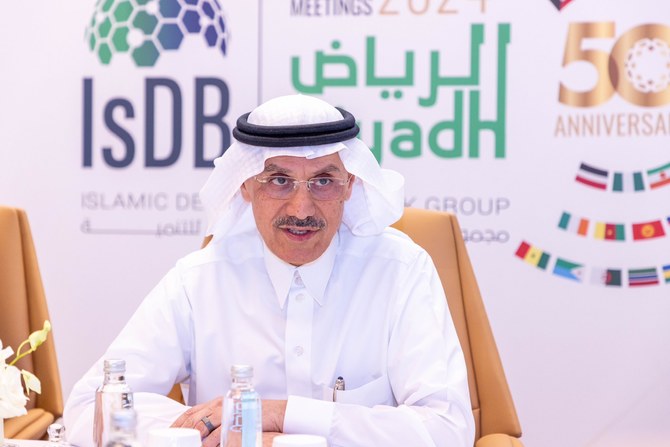
RIYADH: Since its establishment over 30 years ago, the Islamic Development Bank has supported its member states with $151 million in the form of investments and trade deals, said the top executive of the bank.
In his opening remarks at the 12th Private Sector Forum held on the sidelines of the 18th IsDB annual meetings in Riyadh on Sunday, the bank’s president, Mohammed Sulaiman Al-Jasser, said the financial institution has pumped in over $108 billion to support development projects in member states since its inception.
Speaking about the event, the IsDB chief said it offers potential investors an opportunity to network, exchange experiences, establish partnerships, and launch trade initiatives.
Al-Jasser said it is “a very good opportunity” to explore different opportunities and services provided by various IsDB institutions to support the private sector’s development.
He said the IsDB’s body to support the private sector in its member countries has initiated 451 projects worth $6.9 billion across various sectors such as the financial sector, agriculture, and energy.
“It has different investment operations in 50 countries. In 2023, it focused on supporting small and medium enterprises in member states,” Al-Jasser said.
He said the International Islamic Trade Finance Corp. was established in 2008 and has been supporting member states since then with financing facilities. “In 2023 alone, it issues loans worth over $75 million.”
The IsDB president said the bank strongly believed in supporting the private sector in member states.
Al-Jasser went on to say that the IsDB has “also signed many agreements and conventions to make use of the opportunities in the field of investment and trade” in member states.
The annual meetings coincide with IsDB’s golden jubilee, as the institution celebrates 50 years of promoting economic and social development in 57 member countries, under the slogan ‘Taking pride in our past, shaping our future: authenticity, solidarity, and prosperity’ that reflects the bank’s legacy and future goals.
Finance ministers, financial institutions’ representatives, Islamic finance experts, private sector, and non-governmental organizations are participating in the meetings.
Among the annual meetings’ prominent events are the Governors’ Roundtable, the 18th IsDB Global Forum on Islamic Finance, the IsDB Group Private Sector Forum 2024, the Philanthropy Forum, and the Future Vision Symposium, reported SPA.
Discussions address pressing issues such as multidimensional poverty, South-South cooperation, and financing the Sustainable Development Goals.
Meanwhile, the CEOs of the bank’s entities will meet in a strategic session titled ‘Unlocking Economic Potential’ which reflects IsDB’s commitment to promoting economic growth.



